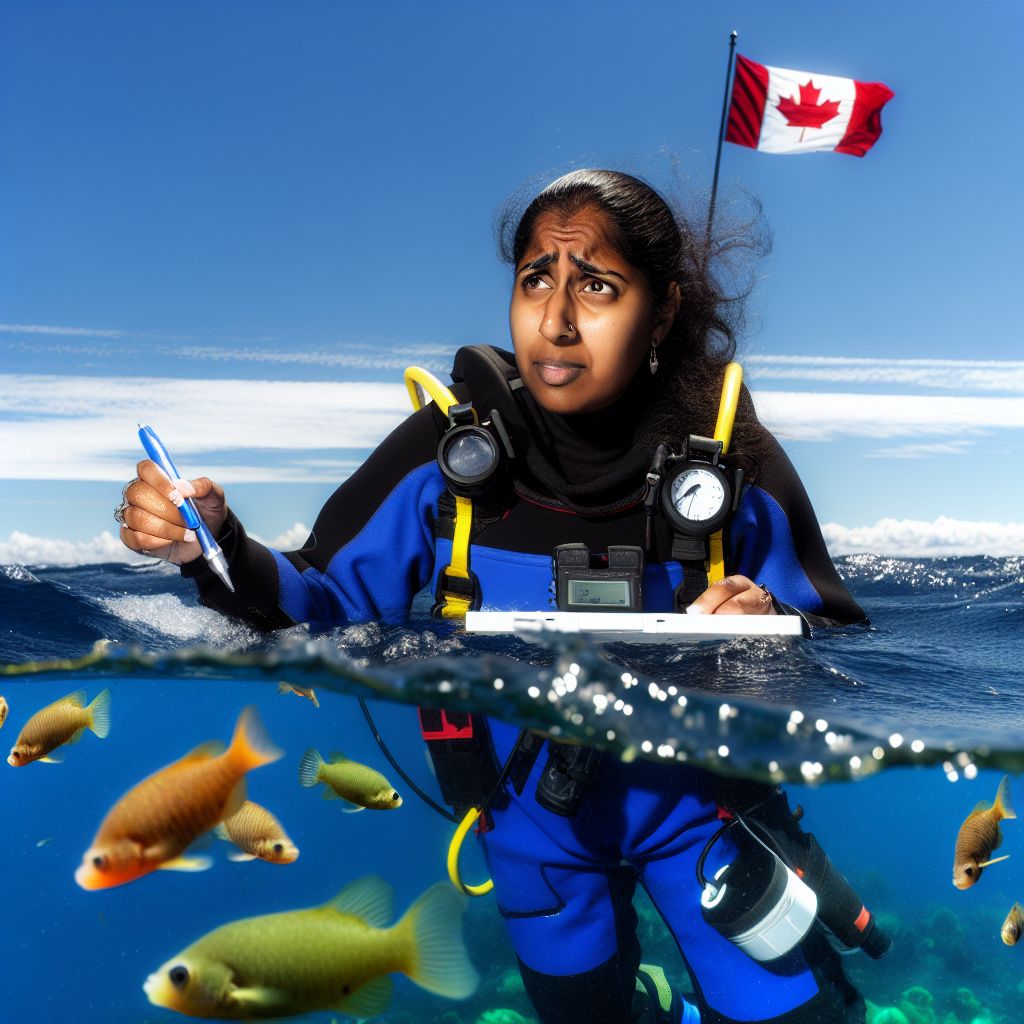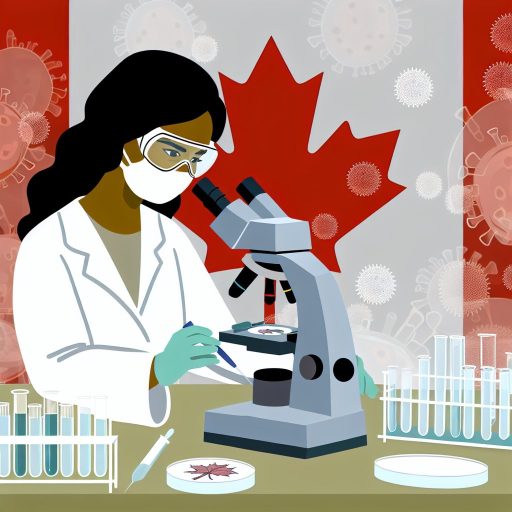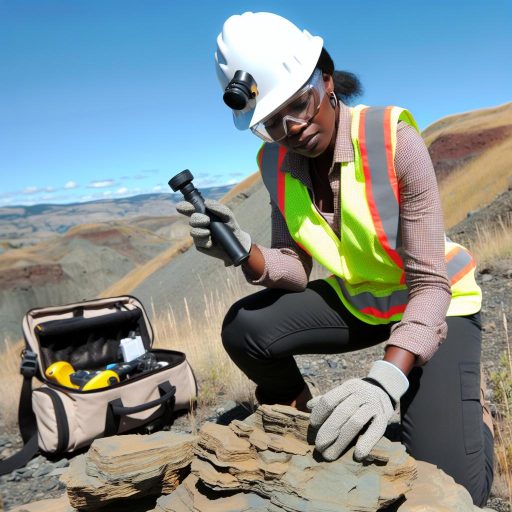Understanding Marine Ecosystems and Biodiversity
The Importance of Marine Ecosystems
Marine ecosystems play a crucial role in the health of our planet.
They support a vast array of biodiversity, from microscopic phytoplankton to massive whales.
Additionally, these ecosystems provide essential services such as oxygen production and carbon sequestration.
Understanding these systems helps marine scientists address environmental challenges.
Main Components of Marine Ecosystems
Marine ecosystems consist of various components including water, organisms, and nutrients.
Physical factors like temperature and salinity influence these ecosystems significantly.
Essentially, the interactions among these components create a delicate balance.
For instance, coral reefs, one of the most diverse marine habitats, host thousands of species.
The Role of Biodiversity
Biodiversity in marine ecosystems contributes to their resilience.
High biodiversity enables ecosystems to recover from disturbances more effectively.
Moreover, each species plays a unique role in maintaining ecological balance.
As a result, conservation efforts focus on protecting marine biodiversity.
Human Impacts on Marine Ecosystems
Human activities significantly affect the health of marine ecosystems.
Overfishing depletes fish stocks, disrupting food webs.
Pollution introduces harmful substances into the oceans, threatening marine life.
Climate change leads to ocean warming and acidification, further jeopardizing these habitats.
Tackling Conservation Challenges
Effective marine conservation strategies are essential for protecting biodiversity.
Marine protected areas (MPAs) serve as crucial tools for ecosystem preservation.
Collaborative efforts among scientists, policymakers, and communities enhance these strategies.
Education and awareness raise public support for sustainable practices.
Career Opportunities in Marine Science
Individuals interested in marine ecosystems can pursue various career paths.
Marine research positions allow scientists to uncover new knowledge.
Conservation organizations work to protect these vital ecosystems.
Education roles empower communities to engage in sustainable practices.
Therefore, opportunities are abundant for those passionate about oceanography.
Unlock Your Career Potential
Visualize a clear path to success with our tailored Career Consulting service. Personalized insights in just 1-3 days.
Get StartedStrong Research and Analytical Skills
The Foundation of Oceanography
Research and analytical skills are essential for any successful oceanographer.
These skills allow you to investigate complex marine environments effectively.
They also enable you to interpret vast amounts of data accurately.
Conducting Effective Research
Conducting thorough research requires a systematic approach.
You must formulate clear research questions to guide your investigations.
Accessing relevant scientific literature is crucial at this stage.
Familiarizing yourself with current oceanographic studies will expand your knowledge.
Data Collection Techniques
Various data collection techniques are employed in oceanography.
Fieldwork often involves sampling water, sediment, and marine organisms.
Utilizing technology, such as remotely operated vehicles, enhances data collection.
Additionally, employing sensors helps gather real-time oceanographic data.
Data Analysis and Interpretation
After data collection, analysis plays a pivotal role.
Statistical methods are frequently employed to analyze complex datasets.
Software tools, like MATLAB or R, assist in processing this information.
Interpreting results accurately leads to meaningful conclusions.
Communicating Findings
Effective communication of research findings is paramount.
You must convey complex information to various audiences clearly.
Utilizing visual aids, such as charts and graphs, can enhance understanding.
Publishing your research in journals contributes to the scientific community.
Continuous Learning and Development
The field of oceanography is constantly evolving.
Staying updated with new techniques and technologies is vital.
Participating in workshops and conferences enhances your skills.
Networking with other professionals fosters collaboration and knowledge sharing.
Proficiency in Data Collection and Environmental Monitoring
Importance of Data Collection
Data collection is essential for oceanographers.
It provides insights into ocean dynamics and ecosystems.
Furthermore, precise data helps predict environmental changes.
Techniques for Effective Data Collection
Oceanographers employ various techniques for data collection.
For instance, they use remote sensing technology.
This technology facilitates monitoring vast ocean areas efficiently.
Additionally, in-situ measurements are crucial.
These measurements provide detailed information about specific locations.
Environmental Monitoring Strategies
Consistent environmental monitoring is vital for ocean protection.
Oceanographers implement long-term monitoring programs.
These programs track changes over time in marine environments.
Moreover, they utilize innovative technologies like autonomous underwater vehicles.
These vehicles enhance the capability to collect data in hard-to-reach areas.
Collaboration in Data Collection
Teamwork is key in effective data collection efforts.
Oceanographers often collaborate with diverse specialists.
For example, they partner with biologists and climatologists.
This collaboration enriches the data collected and its analysis.
Ultimately, teamwork leads to more comprehensive research findings.
Tools and Technologies Used
Oceanographers rely on specialized tools for effective monitoring.
They utilize sonar systems to map the seafloor.
Additionally, they implement buoys equipped with sensors.
These buoys continuously gather data on ocean temperature and salinity.
Such technologies ensure accurate and ongoing assessments of ocean health.
Gain More Insights: Exploring the Daily Work of a Geneticist in Canada
Knowledge of Oceanographic Technology and Tools
Understanding Oceanographic Equipment
Oceanographers utilize various tools and technologies to gather data.
Common instruments include CTD units, profilers, and buoys.
Additionally, underwater vehicles help explore deep-sea environments.
These devices measure temperature, salinity, and depth effectively.
Importance of Data Analysis Software
Data analysis software is crucial in oceanography.
Programs like MATLAB and Python help interpret complex datasets.
These tools allow for effective visualization of oceanographic trends.
Furthermore, they enable modeling of ocean currents and climate impacts.
Familiarity with Remote Sensing Technologies
Remote sensing technologies enhance oceanographic research.
Satellites provide essential data on sea surface temperatures.
These technologies also assist in monitoring ocean color and chlorophyll levels.
Additionally, they support large-scale assessments of marine ecosystems.
Participating in Hands-On Training
Hands-on training is vital for emerging oceanographers.
Internships with research institutions provide practical experience.
Fieldwork allows students to operate equipment in real-world settings.
Additionally, collaborative projects foster teamwork and problem-solving skills.
Discover More: How Canadian Physicists Impact Global Scientific Research
Ability to Collaborate in Interdisciplinary Teams
Importance of Collaboration
Collaboration is essential in oceanography.
This field encompasses diverse scientific disciplines.
Working together enhances research and problem-solving.
Oceanographers frequently partner with biologists, chemists, and geologists.
This team effort provides comprehensive insights into marine phenomena.
Effective Communication Skills
Clear communication is crucial in interdisciplinary teams.
Oceanographers must articulate complex concepts clearly.
This clarity improves overall team understanding.
Additionally, good listening fosters mutual respect and collaboration.
Respecting Diverse Perspectives
Each discipline brings unique viewpoints to oceanography.
Appreciating these perspectives promotes innovative solutions.
Team members should remain open to different ideas.
This openness can lead to breakthroughs in research methodologies.
Building Trust Within Teams
Trust is the foundation of successful collaboration.
Oceanographers should demonstrate reliability and integrity.
Building trust takes time but is worth the effort.
Trust leads to a supportive and productive team environment.
Integrating Technology and Tools
Today’s oceanography relies heavily on technology.
Team members must be proficient with analytical tools.
Collaboration on technology ensures smoother information sharing.
Utilizing shared platforms enhances group productivity.
Continual Learning and Adaptation
The field of oceanography is always evolving.
Oceanographers should embrace lifelong learning.
Being adaptive to new methods and technologies is essential.
Continuous education promotes effective teamwork and innovation.
Learn More: The Importance of Geologists in Natural Resource Management

Effective Communication Skills for Presenting Findings
Understanding Your Audience
Knowing your audience is crucial for effective communication.
This understanding helps you tailor your message appropriately.
Additionally, it enables you to adjust your technical language.
Consider their background and experience levels.
This consideration ensures your presentation resonates with them.
Clarity and Precision in Language
Use clear and concise language during your presentations.
Avoid jargon that may confuse your audience.
Instead, explain complex terms when necessary.
For instance, define technical concepts briefly.
Visual Aids for Better Engagement
Incorporate visual aids to enhance understanding.
Graphs and charts can illustrate data clearly.
Use images to support your key points effectively.
Furthermore, keep slides uncluttered and focused.
Practice and Rehearse
Regular practice improves your delivery skills.
Rehearse in front of peers to gain feedback.
This feedback helps you identify areas for improvement.
Consider timing your presentation to maintain audience interest.
Handling Questions Confidently
Encourage questions to foster audience interaction.
Responding thoughtfully shows your expertise.
Stay calm and composed while answering inquiries.
If you don’t know an answer, admit it gracefully.
Feedback for Continuous Improvement
Seek feedback after your presentations for growth.
Implement constructive criticism into future presentations.
This practice helps you become a more effective communicator.
Ultimately, continuous improvement builds your confidence.
Delve into the Subject: Key Challenges Facing Ecologists in Canada
Familiarity with Geographic Information Systems (GIS)
Importance of GIS in Oceanography
Geographic Information Systems play a crucial role in oceanography.
They allow oceanographers to analyze spatial data effectively.
Moreover, GIS helps in visualizing oceanographic data in meaningful ways.
These systems support habitat mapping and resource management.
Key Features of GIS
GIS integrates various data sources for comprehensive analysis.
It employs mapping tools to visualize complex datasets.
Additionally, GIS includes analytical tools for modeling ocean processes.
This integration supports informed decision-making in marine conservation.
Software Proficiency
Proficiency in GIS software is essential for oceanographers.
Common software includes ArcGIS and QGIS for analysis.
These tools help in managing and interpreting large data sets.
Familiarity with programming languages enhances GIS capabilities further.
Real-World Applications of GIS
GIS enhances research on ocean currents and climate change.
It assists in coastal zone management and marine spatial planning.
Furthermore, GIS is vital in tracking marine pollution sources.
These applications contribute to better environmental protection strategies.
Developing GIS Skills
To succeed, take courses on GIS technology and tools.
Engage in hands-on projects to apply theoretical knowledge.
Additionally, joining professional organizations can provide networking opportunities.
Participating in workshops helps stay updated with GIS advancements.
Adaptability to Fieldwork and Varied Environmental Conditions
Overview of Adaptability
Adaptability is essential for oceanographers working in the field.
Conditions often shift, requiring quick adjustments.
Being flexible fosters success in challenging environments.
Understanding Environmental Variability
Oceanographers encounter diverse weather conditions.
Strong winds and heavy rains can disrupt planned activities.
Understanding local climate patterns helps in preparation.
Adjusting to Field Conditions
Work often takes place in remote locations.
Travel to these locations can be unpredictable.
Being prepared for logistics can minimize downtime.
Maintaining a ready mindset is crucial for success.
Technical Skills for Fieldwork
Technical proficiency is vital for effective data collection.
Familiarity with tools ensures accurate measurements.
Oceanographers must learn to troubleshoot equipment issues.
Additionally, maintaining gear is essential for fieldwork efficiency.
Collaboration and Teamwork
Fieldwork often involves small team environments.
Clear communication enhances safety and performance.
Collaborative problem-solving fosters efficient work processes.
Safety Awareness
Safety is a top priority during field expeditions.
Understanding risks is essential when working at sea.
Being trained in safety protocols reduces accidents.
Preparedness enhances overall team confidence and effectiveness.
Additional Resources
is it worth studying marine biology? im worried about the money : r …
Spotlighting Postdoctoral Scholars at Scripps | Scripps Institution of …




